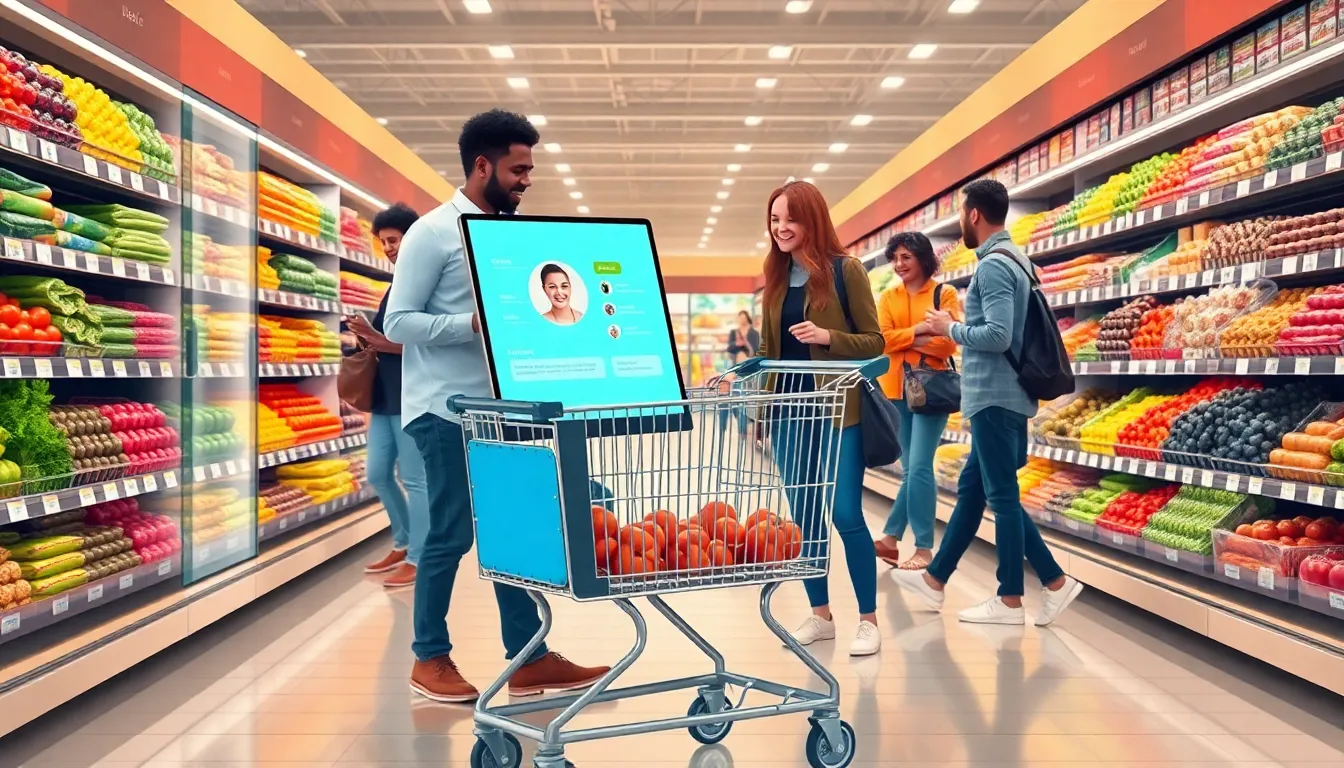Imagine wheeling through the grocery store with a cart that not only holds your snacks but also knows your shopping habits better than your best friend. Welcome to the world of smart shopping cart technology, where convenience meets innovation in the most delightful way. These high-tech carts are designed to make shopping feel like a breeze, transforming mundane errands into an interactive experience.
Table of Contents
ToggleOverview of Smart Shopping Cart Technology
Smart shopping carts incorporate advanced technology to improve the grocery shopping process. These carts utilize sensors and cameras to gather data on customers’ behaviors and preferences. With this information, they provide personalized recommendations, enhancing the overall shopping experience. Shoppers can access real-time pricing and product information directly on a digital display integrated into the cart.
Navigation features guide users to products throughout the store, reducing shopping time. Additionally, some models facilitate mobile payment options, allowing for a smooth checkout process. Retailers benefit from collecting valuable data on consumer patterns, which informs inventory management and marketing strategies.
Smart shopping carts often feature weight sensors that ensure accurate pricing calculations. By knowing the weight of each product added, these carts minimize pricing discrepancies at checkout. Furthermore, some carts integrate loyalty program features, rewarding customers with points or discounts as they shop.
In terms of user engagement, gamification elements encourage customers to explore the store more thoroughly. Shoppers might complete challenges or earn rewards for purchasing specific items. Such interactive experiences not only increase sales but also foster brand loyalty.
Overall, smart shopping cart technology represents a significant shift in retail, combining convenience with personalization and efficiency. As technology evolves, these carts will likely become standard in modern grocery stores, redefining how consumers shop.
Benefits of Smart Shopping Carts


Smart shopping carts offer numerous advantages that enhance both the shopping experience and store operations. These benefits significantly improve customer satisfaction and streamline processes.
Enhanced Customer Experience
Smart shopping carts elevate the shopping experience by providing convenience and personalization. Shoppers receive tailored product recommendations based on their preferences. Digital displays offer real-time pricing information, helping customers make informed decisions. Navigation tools assist users in locating items quickly, reducing time spent searching. Gamification features engage shoppers with rewards for exploring new products, creating an enjoyable atmosphere. As shoppers interact with technology, they enjoy a modernized experience that aligns with their needs.
Increased Operational Efficiency
Retailers gain substantial operational efficiency through smart shopping cart technology. Data gathered from customer interactions helps optimize inventory management strategies. This technology enables accurate pricing through integrated weight sensors, reducing errors during checkout. Smart systems streamline payment methods, expediting the checkout process. Analytics generated from shopping patterns inform marketing decisions, allowing stores to tailor promotions effectively. By implementing smart carts, retailers enhance workflow and improve the overall shopping environment.
Key Features of Smart Shopping Carts
Smart shopping carts incorporate various features that enhance the shopping experience, making it more efficient and engaging for customers.
RFID and Barcode Scanning
RFID technology and barcode scanning simplify the checkout process. Customers scan items as they place them in the cart, ensuring accurate tracking of products. RFID tags allow for quick identification of items, while barcodes offer versatility in scanning. Shoppers benefit from this efficiency since they see updated prices on the digital display in real-time. Consequently, waiting times at checkout decrease significantly, enhancing overall satisfaction. Retailers gain insights into customer behavior through scanned data, allowing them to make informed inventory decisions.
Real-Time Inventory Tracking
Real-time inventory tracking enables immediate updates on product availability. Smart carts communicate with store databases, showing customers which items are in stock. Shoppers receive alerts when products are low or out of stock, improving their experience. This feature not only helps users avoid disappointment but also encourages them to explore alternative items. Retailers utilize this data to maintain optimal inventory levels, ensuring popular products are readily available. Enhanced inventory management streamlines store operations while simultaneously increasing customer satisfaction.
Challenges in Implementing Smart Shopping Cart Technology
Smart shopping cart technology presents several challenges that retailers need to address to leverage its full potential.
Cost Considerations
Implementing smart shopping cart technology involves significant initial investment. Retailers face expenses related to cart production, integration of sensors, software development, and maintenance. Hardware costs can range from $100 to $500 per cart, depending on features. Ongoing costs for system updates and technical support also add to overall expenses. Many retailers find it necessary to assess the return on investment (ROI) carefully. Budget constraints may limit some businesses from adopting these technologies fully. Establishing a balance between innovation and financial feasibility proves crucial for sustained success.
Integration with Existing Systems
Integrating smart shopping carts with existing store systems poses notable challenges. Compatibility with current point-of-sale systems, warehouse management, and inventory software is essential to ensure seamless operations. Data synchronization requires robust APIs and continuous updates to maintain accuracy across platforms. Staff training on using these advanced systems becomes important to maximize effectiveness. Establishing a cohesive digital ecosystem can be time-consuming and complicated. Failure to integrate effectively may hinder operational efficiencies and negate potential benefits of smart technology.
Future Trends in Smart Shopping Cart Technology
Emerging trends in smart shopping cart technology emphasize automation, advanced data analytics, and enhanced user experiences. Artificial intelligence increasingly plays a role in personalizing shopping experiences, analyzing customer behavior in real-time to recommend products based on preferences and past purchases. This shift towards AI leads to more tailored interactions within the shopping environment.
Augmented reality features are expected to revolutionize how customers navigate stores. Shoppers may utilize their smartphones to view product details and promotions by simply pointing at items. This integration creates an interactive experience, engaging customers directly as they shop.
Integration with mobile applications represents another key trend. Apps may offer additional functionalities, like creating shopping lists or providing personalized discounts. This level of connectivity could foster deeper engagement, aligning shopping habits with digital interactions.
Robust security measures are also crucial as smart carts collect vast amounts of customer data. Implementing strong encryption protocols can safeguard sensitive information while maintaining customer trust. Retailers committed to data security can enhance their reputation as customer-focused entities.
Innovations in payment processing are likely to continue evolving. Contactless payments and digital wallets streamline checkout experiences, reducing wait times. By facilitating quicker transactions, smart carts help create a more efficient shopping environment.
Sustainability trends will affect smart cart technology too. Carts manufactured with eco-friendly materials contribute to a greener retail landscape. Adopting sustainable practices aligns with growing consumer preferences for environmentally responsible products.
Each of these trends highlights the potential of smart shopping carts to revolutionize the retail landscape. As technology progresses, it shapes the future of grocery shopping into a more efficient, convenient, and personalized experience.




